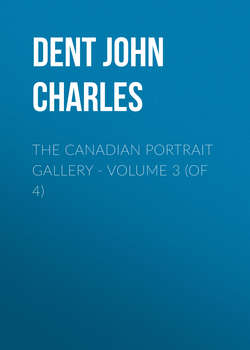Читать книгу The Canadian Portrait Gallery - Volume 3 (of 4) - Dent John Charles - Страница 2
THE REV. ROBERT FERRIER BURNS
ОглавлениеDr. Burns was born at Paisley, Scotland, on the 23rd of December, 1826. After spending a term of four years at the Public Grammar School of that town, he was entered as a student at the University of Glasgow in the month of November, 1840, before he had quite completed his fourteenth year. He remained at that seat of learning four sessions, during which he achieved high standing in his classes, and carried off several prizes, including two in Latin. He stood third in Greek, second in Logic, and first in Moral Philosophy. While attending the University he had for associates Principal McKnight, of Halifax, the Rev. William Maclaren, of Blairlogie, and the late Rev. John Maclaren, of Glasgow. In 1844-5 he attended New College, Edinburgh, during the second session of its existence, and sat at the feet of Drs. Chalmers, Cunningham and Duncan. He had meanwhile resolved on emigrating to Canada, and on the 29th of March, 1845, he sailed from Greenock for Quebec. He made his way to Toronto, where he attended two sessions at Knox College, having for his contemporaries there Dr. Black, of Manitoba, and the late Rev. James Nisbet, of the Prince Albert Mission. During his collegiate career he acted as Student Catechist, and preached as a volunteer at Proudfoot's Mills, and also at Oakville. During the summer of 1846 he laboured to good purpose at Niagara. In April, 1847, he was licensed to preach by the Presbytery of Toronto, and on the first of July following he was ordained as first pastor of Chalmers Church, Kingston. During his residence at Kingston he officiated for a year as Chaplain to the Forty-first Regiment of Highland Infantry.
On the 1st of July, 1852, he married Miss Elizabeth Holden, a daughter of Dr. Rufus Holden, of Belleville, and a sister of the wife of Professor Gregg, of Toronto. By this lady he now has a family of eight children, consisting of four sons and four daughters. After a pastorate of exactly eight years he left Kingston on the 5th of July, 1855, and settled at St. Catharines as first pastor of the United Church. He remained there nearly twelve years, during eight of which he also had charge of a congregation at Port Dalhousie, four miles distant. During his ministry at St. Catharines the new church now known as Knox Church was erected, and his congregation subsequently worshipped there. In 1862 he took a conspicuous part in starting Sabbath School Conventions in this country, which have since been attended by many blessings to the young. In the month of July, 1866, the degree of Doctor of Divinity was conferred upon him by Hamilton College, near Utica, in the State of New York, the leading literary institution of the New School of Presbyterians in that State. On the 20th of March, 1867, he became first pastor of the First Scotch Presbyterian Church in Chicago, which then and for some years thereafter belonged to the Canadian Church. During his incumbency of this charge he received several calls from various churches, all of which were declined. His Chicago pastorate lasted three years, during which the membership of his church trebled in number, and a fine new church was erected by the congregation on the corner of Adams and Sagamore Streets. In October, 1867, he accompanied the Rev. D. L. Moody, the Evangelist, from Chicago to Toronto, on the occasion of the first sitting of the Young Men's Christian Association Convention in the latter city. In the beginning of May, 1870, he returned to Canada, and was inducted into the pastorate of Cote Street Church, Montreal, where Dr. Fraser and the present Principal McVicar had previously ministered. Here he remained five years.
On the 18th of March, 1875, he was settled over Fort Massey Church, Halifax, of which the Rev. J. K. Smith, of Galt, had been for two years pastor. Here Dr. Burns has ever since remained. The congregation has since its commencement discarded pew rents, and has been conducted on the weekly free-will-offering system, the offertory being collected at the church door. Their annual givings to church purposes are said to exceed $100 for each family. He was Moderator of the Synod of Montreal in 1873, and also Chairman of the Montreal College Board; and on his removal to Halifax he was elected to the same post there, which he still fills. During the session of 1877 he delivered special courses of lectures before the Montreal and Halifax students, and in 1878 these were followed up by a second special course in the Halifax College. In 1877 he was associated with Principal Grant and others in pushing forward the $100,00 °College Endowment Fund.
Dr. Burns is also known as an author. As early as 1854 he contributed to the Anglo-American Magazine, published in Toronto; and several years later to the Presbyterian Magazine. In 1857 he published "The Progress and Principles of Temperance Reform;" and in 1865, in conjunction with the Rev. Mr. Norton, of St. Catharines, "Maple Leaves for the Grave of Abraham Lincoln." In 1872 he wrote and published his most voluminous work, "The Life and Times of Dr. Robert Burns, of Toronto." This work passed through three editions, and was a decided success. His other works are chiefly pamphlets, sermons, and short fugitive pieces.
At the meeting of the General Assembly held at Ottawa in 1879 Dr. Burns was one of the eight clerical delegates elected to attend the General Presbyterian Council, to be held in Philadelphia during the present year. Last summer he attended the Sunday School Celebration held in London, England, to commemorate the founding of Sunday Schools by Robert Raikes, in Gloucester, a century ago.
